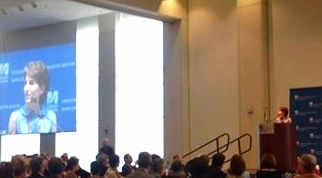Schiff Keynote Speech Highlights Fifth BIO Conference
More than 200 biographers, including ones from Australia, Canada, the Netherlands, New Zealand, and the United Kingdom, attended the fifth annual Compleat Biographer Conference, held May 17 at the University of Massachusetts Boston. As at past conferences, one of the day’s highlights was the presentation of the BIO Award at the afternoon luncheon, which this year went to Stacy Schiff, author of Saint-Exupéry: A Life,A Great Improvisation: Franklin, France, and the Birth of America, Cleopatra: A Life and the Pulitzer Prize-winning Vera (Mrs. Vladimir Nabokov): Portrait of a Marriage.
At the day’s luncheon, outgoing BIO President James McGrath Morris presented Schiff with the award, noting that her dedication to the craft of biography went far beyond the written page to her longstanding and ongoing support of BIO.

Schiff delivers her keynote address to an appreciative audience.
In her keynote speech, Schiff addressed the two major problems biographers face: a paucity of information or an overabundance of it. She termed the latter “the haystack in the haystack” and said “nothing could be worse,” because “documentation is not revelation.” Writing about Franklin’s years as a diplomat in France, Schiff found voluminous material on him in various archives, though the information did not always reveal the essence of the man at the time.
Schiff recounted enduring the other extreme, the needle in the haystack, while researching Vera Nabokov and Cleopatra. Yet at times, she said, a lack of information, or what a subject leaves out of his or her own writings, can be telling. She believes that “the story lurks in the excisions, the elisions, the denials,” in information distorted or destroyed. The biographers’ challenge, Schiff said, is to find their subject’s voice, or rather, to “help their subject to find his voice, to coax him to speak, when he opts not to do so himself.”
To find that voice, biographers need to make sure the subject is not drowned out by the louder voice of other sources—in the case of Franklin, the louder voice belonging to fellow diplomat John Adams. With Cleopatra, it was Cicero. But another danger is the “overquotable” subject who leaves too many of his own words behind, “as he risks drowning himself out.” Schiff sees this as a risk for any biographer of Oscar Wilde.
Schiff peppered her talk with good humor, calling her Cleopatra book “a combover of a biography” because of the lack of primary sources, and recounting Peter Gay’s adage that if you can’t read a source’s handwritten accounts of an event, it didn’t happen. Schiff ended with the thought that the best-documented lives don’t make for the best biographies. “The idea, after all,” she said, “is to transcend the material.”
Prior to Schiff’s address, Quincy Whitney introduced a short video tribute to former BIO member Margery Heffron, who died last year before completing her recently published Louisa Catherine: The Other Mrs. Adams. Whitney noted Heffron’s role in helping to form the Boston Biographers Group, and in the video she praised the qualities that made Heffron an excellent biographer: an “inquiring mind, relentless determination, and empathetic heart.”
The luncheon’s events also included the awarding of the first BIO/Hazel Rowley Prize for Best Proposal for a First Biography to Holly Van Leuven. A recent graduate of Emerson College, Van Leuven is writing the first biography of actor Ray Bolger. Van Leuven told BIO members that she hoped to produce a book “worthy of your good opinion and of Ms. Rowley’s legacy.” Van Leuven received a check for $2,000 and will also receive representation by a literary agent, a year’s membership in BIO, and the attendant publicity from being selected for the prize.
The prize is named in memory of Hazel Rowley, a BIO enthusiast from its inception who understood the need for biographers to help each other. Before her death at age 59 in 2011, Rowley had authored four distinguished books, including Richard Wright: The Life and Times and Franklin and Eleanor: An Extraordinary Marriage.